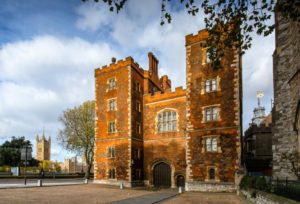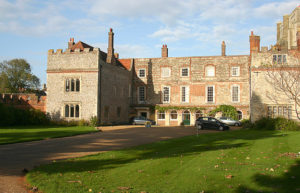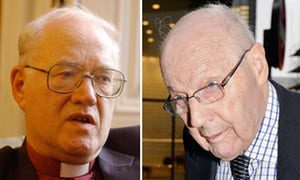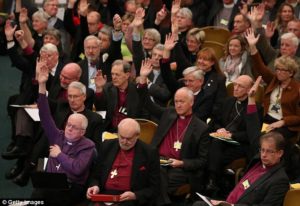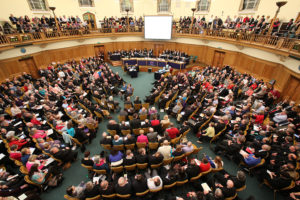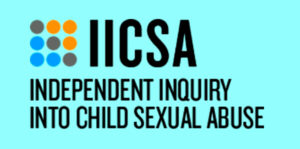 Today, the last day of the Peter Ball hearing has left me with a number of reflections. It has been in many ways been a tough week to listen to all the testimonies. But however painful it has been for me, it will have been far more traumatic for those who have suffered abuse in the past and for whom such evidence arouses deeply disturbing memories. It remains to be seen whether the conclusion of this part of the Inquiry brings any kind of peace to those who have suffered.
Today, the last day of the Peter Ball hearing has left me with a number of reflections. It has been in many ways been a tough week to listen to all the testimonies. But however painful it has been for me, it will have been far more traumatic for those who have suffered abuse in the past and for whom such evidence arouses deeply disturbing memories. It remains to be seen whether the conclusion of this part of the Inquiry brings any kind of peace to those who have suffered.
The hearing today once again raised the question of the culpability of George Carey in his woefully inadequate attempts to deal with the aftermath of Ball arrest and caution in 1992/3. I have already expressed an opinion on this, but I was quite swayed by the strong arguments of William Chapman who, in his concluding remarks, suggested that the behaviour of Carey amounted to a virtual criminal conspiracy to pervert justice. It remains to be seen which side of the fence the Inquiry will come down on. Will they decide that the former Archbishop has behaved so foolishly and incompetently that he is himself is guilty of a punishable offence, or will they take a softer line as I have done? One telling piece of evidence against Carey was that he allowed the seven letters from victims to be shared with Ball’s lawyers but not the police who were responsible for prosecuting.
The real heart of what has been revealed this week is not the actual abuse that Ball inflicted but the suggestion that there was a massive Establishment conspiracy to protect him. The great and good were apparently seeking to protect one of their own. Whether or not Carey was caught up in any conspiracy is not clear. What is certain is that Ball’s brother, Michael Ball was stirring up some of his fellow bishops and other friends in places of influence to write letters on Ball’s behalf. Ros Hunt had received phone calls from bishops urging her to shut down the complaints of the victims she knew. The activity of these unnamed bishops is indeed shocking. Even if they were convinced of Ball’s innocence, they were behaving in a totally dishonourable and potentially criminal way. I regret that these bishops were not named. The clumsy attempt by Michael Ball to record conversations with individuals on the phone, speaks of a concerted effort make things difficult for anyone who had information against Peter Ball. I might also remind my reader of the extraordinary events in the palace in Chichester when the Bishop Eric Kemp, when talking to Inspector Murdock, was quite clearly acting with malice to prevent the pursuit of truth and justice.
Talk of the Establishment having an interest in protecting Ball, one of their own, leads me to feel that we may be on the edge of another bigger scandal which touches on this case. This did not come up in the present IICSA hearing. I am referring to the Smyth/Iwerne affair. To remind my readers, this was a scandal affecting Winchester College boys who were among those who attended Christian evangelical camps at Iwerne in Dorset. John Smyth, a well-connected lawyer, administered beatings to some of these boys as part of a ‘spiritual discipline’. Some boys received as many as 800 lashes. The subsequent effect on their mental health was little short of catastrophic. Actual sexual activity was not recorded but it is hard to conclude that there were no sexual motives for behaving in this extraordinary way.
An internal church report about Smyth’s behaviour was written in 1982 and this concluded that his actions were serious enough to attract criminal charges. The report was shared around the trustees of the Iwerne Trust (later to become the Titus Trust). Their response was to ‘ship’ Smyth off to Zimbabwe where his nefarious activities seem to have continued. This action of spiriting him out of the country drew on the connections and resources of quite a number of people.
Why do I bring up the Smyth affair in the context of the IICSA hearings? It is because there are uncomfortable parallels with the Ball case. Both incidents involve individuals of high social standing. The Iwerne trustees who dealt with the Smyth scandal reads like a Who’s Who of the evangelical world of the time. In both cases there was a rallying round to protect an individual who was guilty of criminal behaviour towards young people. Each story also involves an Archbishop. Justin Welby, an Eton boy, attended the Iwerne camps in the 70s and later as a junior officer while an undergraduate in Cambridge. At the time of the Smyth scandal at the end of the 70s, Welby had graduated and was living in France. There is however evidence from a published account of his life that he remained in touch with the camps as a speaker from time to time. Some of those involved with the story are incredulous that he would not have heard of the rumours about Smyth when he was a young adult. For him to claim that he only knew of Smyth’s activities when he became Archbishop in 2013 stretches belief.
The story of Ball and that of Smyth seem to have uncomfortable links. The survivors of Smyth are still distressed that the church does not seem to be interested in what they went through. There is no attempt at investigation, no reaching out to them. The telling of their story by Channel 4 was something that happened, and the church seems to want to move on as quickly as possible, hoping that everyone will forget. The lid had to be put back on the bottle as quickly as possible. Clearly that will be impossible to do. But the longer that there is no discussion about the events of the late 70s and early 80s in Winchester, the more the survivors are forced to suffer. Not only is their suffering increased, the story has more potential to blow up in the face of the Church of England to do further harm to its reputation. Just as George Carey may have thought that he was somehow protecting the church by obstructing the Ball story, so the present Archbishop may be playing a similar game with the events connected with Smyth. Police investigations which show a similar competence to that revealed by the Gloucestershire and Sussex police are now needed. Somehow, according to my sources, the activity of the Hampshire police is less vigorous. We may have to wait for some time for this story to reach a conclusion. But, once again it is clear that we must not allow the church to do its own investigations. Bishops may have many skills, but the vigorous uncovering of truth does not appear to be one of them.
